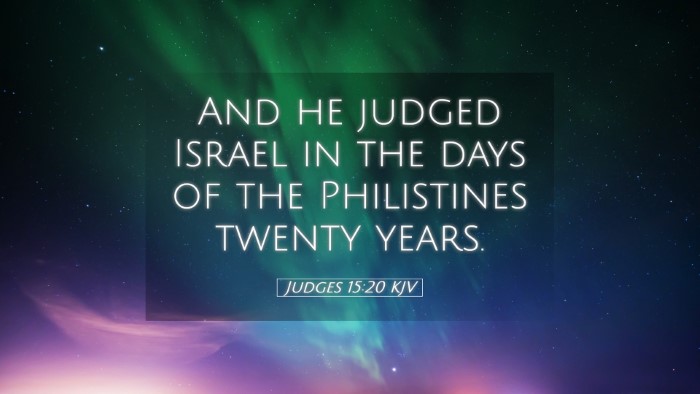Old Testament
Genesis Exodus Leviticus Numbers Deuteronomy Joshua Judges Ruth 1 Samuel 2 Samuel 1 Kings 2 Kings 1 Chronicles 2 Chronicles Ezra Nehemiah Esther Job Psalms Proverbs Ecclesiastes Song of Solomon Isaiah Jeremiah Lamentations Ezekiel Daniel Hosea Joel Amos Obadiah Jonah Micah Nahum Habakkuk Zephaniah Haggai Zechariah MalachiJudges 15:20
Judges 15:20 KJV
And he judged Israel in the days of the Philistines twenty years.
Judges 15:20 Bible Commentary
Commentary on Judges 15:20
Judges 15:20 states: "And he judged Israel in the days of the Philistines twenty years." This passage encapsulates crucial elements of the story of Samson, a judge of Israel, highlighting the period of his leadership amidst Philistine oppression.
Context and Background
To fully comprehend the significance of Samson's judgeship, it is essential to consider the historical and cultural context. The Israelites were facing severe oppression from the Philistines, who had dominance over them for years due to Israel's disobedience and moral decline. This period of the Judges was characterized by a cyclical pattern of sin, servitude, supplication, and salvation.
The Role of Samson
Samson, whose birth was uniquely announced by an angel (Judges 13), was set apart as a Nazirite, dedicated to God from birth. His life serves both as a testament to the power of God working through flawed individuals and as a warning against the dangers of compromise with surrounding cultures.
Insights from Commentaries
Matthew Henry's Commentary
Henry emphasizes that the reference to Samson judging Israel "twenty years" is significant as it illustrates a lengthy period of his activity against the Philistines. His comment on the phrase indicates that despite Samson's personal flaws—his susceptibility to lust and vengeance—his role was fundamentally to deliver Israel from its oppressors. The duration of his judgeship suggests that his influence, however tarnished by his deeds, contributed to Israel’s transient deliverance during a time when Israel desperately needed leadership.
Albert Barnes' Notes
Barnes notes that Samson's judging during the Philistines’ dominance highlights the tension between his personal victories and the national strife experienced by Israel. He draws attention to the struggle faced by the Israelites, not just under foreign oppression but also due to the moral and spiritual decay within their community. Samson's leadership is a mixed narrative; while he is empowered by God to achieve remarkable feats (like the killing of a lion), he also embodies the consequences of straying from God’s commandments. Barnes underscores that Samson began to deliver Israel, showing that God can use even flawed instruments for His purposes.
Adam Clarke's Commentary
Clarke provides a detailed exposition on the implications of Samson’s judgeship. He points out that while Samson was a judge, his methods often complicated the situation rather than resolved it. For instance, Clarke remarks that Samson's approach was often violent and destructive, like the episode with the foxes (Judges 15:4-5), which while bringing momentary relief, further entrenched animosity between the Israelites and Philistines. This highlights a critical aspect of leadership, suggesting that the means by which deliverance is sought are as important as the ends themselves.
Theological Reflections
This verse also invites theological reflection on the nature of God's sovereignty in the midst of human failings. Despite Samson's flaws, God's plans were not thwarted. The mention of his judgeship during Philistine rule serves as a reminder of God's patience and long-term perspective on Israel's redemption. Theological scholars might consider how this reflects on contemporary leadership within the church; moral and spiritual integrity are paramount for those called to lead.
Lessons for Pastors and Theologians
- The Importance of Integrity: Samson’s life illustrates the profound impact of personal integrity on public ministry. His failures serve as a warning for spiritual leaders today.
- God's Use of Imperfect Leaders: Despite human limitations, God can use imperfect individuals. This is vital for encouraging those in ministry, highlighting that God’s grace is greater than our failings.
- Understanding Context: Recognizing the historical context of Scripture enhances understanding and application in today's world. The struggles of the Israelites parallel modern challenges faced by communities of faith.
- Divine Sovereignty: This passage encourages a faith perspective that trusts in God’s plans, reminding us that He is actively working even amid societal turmoil.
Conclusion
Judges 15:20 serves as a poignant reminder of the complexities of leadership in God's kingdom. Samson's legacy prompts both admiration and caution, calling modern leaders to reflect on their motivations, behaviors, and reliance on divine assistance. The commentaries by Henry, Barnes, and Clarke collectively provide a rich tapestry of insights, emphasizing that God's purposes prevail despite human imperfections.


